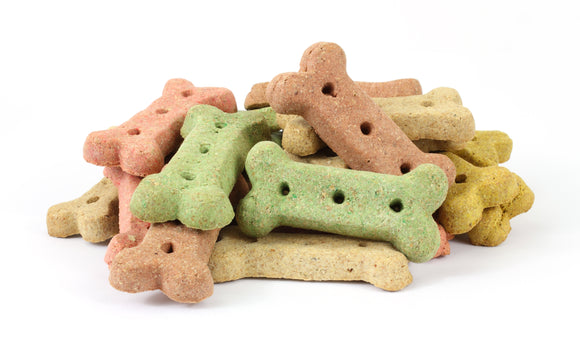
Benefits Of Vitamins And Minerals For Dogs
Table of Contents

Dogs are man's best friends, and they deserve the same love that they give us. They're also very different from cats. One of these differences is their diet. Dogs need to eat more than cats because they have a higher metabolism rate and bigger body size, but it can be hard to find out what your pup needs without consulting a vet or researching online. Here are some minerals and vitamins that you might want to consider adding to your dog diet so that they stay healthy.
Basic Vitamin and minerals requirements for dogs
Dogs basically required proper nutrition for two purposes
- For reproduction and growth
- For maintenance
Vitamins and minerals are present in dog food, and they are required for the normal function of the body. If these vitamins and minerals are not present in the proper amount, dogs can suffer from various problems.
Vitamins
Dogs have a variety of dietary needs, so they may need to take vitamins and supplements. One reason dogs need vitamins is that they are required to synthesize various enzymes in a dog's body. If vitamins are not present in the dog food in the required quantity, it can cause various problems.
The basic vitamins dogs require for proper growth are:
- Vitamin A
- Vitamin B
- Vitamin C
- Vitamin D
- Vitamin E
- Choline
- Vitamin K
Vitamin A
Dogs need vitamin A in their diet for better skin and coat, a strong immune system that fights off infections more effectively, as well as healthy eyes. If your dog is deficient in vitamin A, he or she may have eye problems such as cataracts or corneal ulcers, which can be treated by supplementation with a high-quality multivitamin complex.
Vitamin B
There is a whole family of vitamin B. Vitamin B has a lot of benefits for dogs; some of these include:
Vitamin B1 is responsible for converting carbohydrates into energy, so it supports a strong and healthy metabolism while also helping to maintain proper nervous system function.
Benefits of vitamins B6 for dogs include increased body metabolism, glucose, and glycogen storage rates. This can prevent dangerous blood sugar fluctuations, which are especially useful to those who have diabetes or insulin resistance in their daily lives.
Vitamin B5 plays a major role in helping dogs produce antibodies, enzymes that help with metabolism and energy production. It also helps naturally regulate hormones by metabolizing proteins from carbohydrates to create amino acids, which are then used to create fatty acid chains or neurotransmitters within cells.
Vitamin B12 is also known as Riboflavin. It combines with Niacin to facilitate enzyme function. It is also known as cobalamin (Cbl); this water-soluble nutrient plays an essential role in metabolism by maintaining red blood cells and preventing them from breaking down inside small vessels throughout the body, including brain tissue where they are stored to be used later on when needed.
Dogs need vitamin B9 for proper nerve function, red blood cells, and DNA synthesis. People also have a requirement of this nutrient, but dogs require much more than people do to support their growth needs at every stage of life, from puppyhood through adulthood into old age.
Vitamin C
Dogs can make their own vitamin C but in very little amount, so its supplementation is necessary. Dogs need vitamin C because it helps them metabolize protein. Vitamin C is a water-soluble antioxidant that works by neutralizing free radicals. Free radicals are unstable molecules produced in the body from toxins and pollutants or those naturally released during metabolic processes such as the digestion of food. It can damage cells like DNA, so they must be eliminated before this occurs to prevent disease.
Vitamin D
Dogs need vitamin D because it allows them to absorb calcium and phosphorus, essential for their bone structure.

Vitamin E
Vitamin E is essential for your dog's health. It helps with blood pressure, and it's a great source of antioxidants that protect against all sorts of cancers.
Vitamin E benefits the dogs in many ways, such as protecting cells from oxidative damage (like free radicals), lowering blood pressure levels, reducing cholesterol build-up on artery walls that can cause heart disease or stroke. Vitamin E also protects against various types of cancer like lung, prostate, colon, and mammary glands by preventing cell mutation caused by DNA damage.
Choline
Dogs need choline in their diet because it is an essential nutrient needed for proper liver function. It helps with the metabolism of fat and cholesterol and other bodily processes, including reproduction.
Choline can be found in egg yolks, beef liver, soybeans, peanuts (legumes), whole grains such as brown rice or oats, wheat germ, and other seeds.
Vitamin K
Vitamin K is vital to dogs' survival, as it helps them with blood clotting and prevents bleeding. Dogs need vitamin K in their diet because if they don't get enough Vitamin K from the food, they can die due to excessive internal hemorrhaging.
Dogs cannot produce enough vitamin K on their own; therefore, they must receive supplementation through food or supplements.
Minerals
Dogs need two types of minerals to stay healthy: macro minerals and micro minerals. They both play a role in the dog's overall health but do so differently from one another.
Macro (or major) minerals are required in larger amounts by the body, whereas micro minerals may be needed only in fairly small quantities each day.
The essential macro minerals are phosphorus, sodium, calcium, magnesium, chloride, Potassium, and sulfur.
The basic micro minerals are zinc, copper, iodine, manganese, chromium, and selenium.
Calcium and Phosphorus
Dogs can stay healthy, strong bones with proper dietary levels of calcium and phosphorus. Bones are made up mostly of a mineral called hydroxyapatite that contains calcium (40%) and phosphorus (35%). A dog needs to consume just the right amount of these two nutrients for good bone health because they need both to produce new cells. Other benefits of these nutrients are
- Muscle contractions
- Nerve impulse transmission
- Constriction of vessels
- Hormones secretion
- Blood coagulation
- A co-factor for enzymes
Sodium, chloride, and Potassium
These minerals are the main electrolytes that the dog's body needs. Electrolytes are important for dogs because they help them with the absorption of water. Electrolytes also aid in eliminating toxins and maintaining healthy bodies that can keep a dog's immune system strong, which is especially helpful during times when their body might be fighting off an infection or other type of illness.
Magnesium
Magnesium benefits dogs by making their bones and teeth stronger, improving how well they digest food. It also helps with skin allergies caused by environmental triggers such as pollen or other allergens in the air that cause a reaction to your dog's fur and skin.
Iron
Iron is a mineral that all dogs need. It helps your dog produce protein hemoglobin, which binds to oxygen and transports it from the lungs throughout their body for use by cells in metabolism and other activities such as fighting off infection. Iron also assists with the growth of healthy tissues and blood formation; deficiency may cause anemia, or low white blood cell counts, among other symptoms.
Zinc
Zinc is a mineral that promotes healthy growth and development in dogs. It plays an important role in the production of red blood cells, proper immune function, wound healing, cell division, and protein synthesis. Zinc can be found naturally within all body tissues such as bones, teeth, and muscle tissue, but it's available from dietary sources like meat or fish.
Copper
Copper is an important mineral for dogs because it helps with their development, immunity, and energy. It can help reduce the risk of arthritis in older dogs as well by helping them maintain a healthy weight and mobility. Copper also assists enzymes inside our bodies which are responsible for absorbing iron from food sources efficiently.
Selenium
Selenium is a small trace mineral that has many health benefits for dogs. Selenium, which can be found in food or added to pet products as supplements, helps fight cancer and strengthens the immune system. It also prevents heart disease by making sure there are enough antioxidants available within cells so they do not become damaged over time from free radicals.

Conclusion
Dogs are often referred to as man's best friend, and it is important that you take care of your furry friends by giving them the nutrition they need. One way to do this is by making sure they have a healthy diet with proper vitamins and minerals. In this post, we have covered some basic information about the minerals and vitamins that a dog needs and their benefits.




